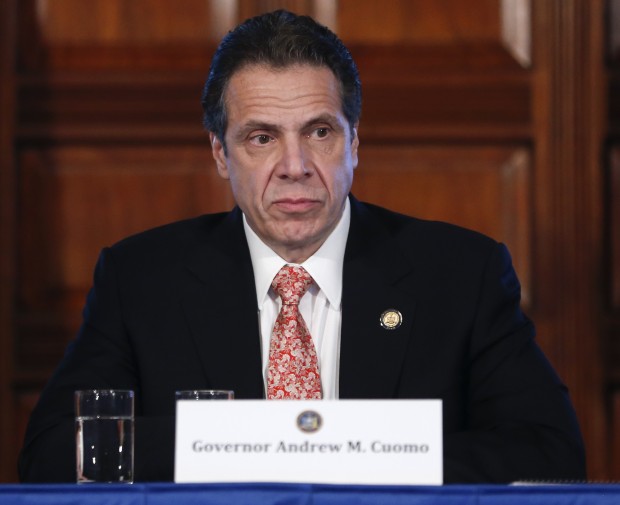New York State bans fracking
-
Marie Cusick

New York Governor Andrew Cuomo’s administration will prohibit fracking in the state, citing unresolved health issues and dubious economic benefits of the widely used gas extraction technique.
New York state officials have decided to ban hydraulic fracturing within their borders, citing health concerns.
Democratic Governor Andrew Cuomo made the announcement at an end-of-year press conference in Albany Wednesday afternoon.
From the New York Times:
The state has had a de facto ban on the procedure for more than five years, predating Mr. Cuomo’s first term. The decision also came as oil and gas prices continued to fall in many places around the country, in part because of surging American oil production, as fracking boosted output.
The decision has been fraught for Mr. Cuomo, a Democrat.
In June 2012, he flirted with approving a limited program in several struggling Southern Tier counties along New York’s border with Pennsylvania. But later that year, Mr. Cuomo bowed to entreaties from environmental advocates, announcing instead that his administration would start the regulatory process over by beginning a new study to evaluate the health risks.
New York’s acting health commissioner Howard Zucker acknowledged there are gaps in the data but said there are many “red flags” and questions about the risks of fracking.
“The science isn’t here,” Zucker said. “But the cumulative concerns based on the information I have read … gives me reason to pause.”
New York State’s Republican chairman, Ed Cox, slammed the health review as a “political charade.” Cuomo says he is expecting “a ton of lawsuits” in the wake of the decision.
Industry representatives in Pennsylvania have pointed out that New York’s decision on fracking will have little bearing here — at least in the near future — since most of New York’s share of the Marcellus Shale contains less economically attractive dry gas.
Christopher Robart, a consultant with IHS Energy, says the decision will have little to no impact on business in Pennsylvania.
“Folks in the industry have put a lot of money into parts of Ohio and Pennsylvania and built infrastructure,” he says. “Once that’s in the ground, there’s a certain amount of stickiness in the market.”
Paul Hartman, northeast director for the industry group, America’s Natural Gas Alliance says since New York took so long with its fracking review, it was doubtful the state could have poached much business from Pennsylvania.
“I think Pennsylvania will continue to prosper as a highly-producing state for our industry,” he says. “New York, in this instance, stands alone.”
New York State Petroleum Council Executive Director Karen Moreau issued a statement blasting Cuomo’s decision as “reckless.” Her counterpart in Harrisburg agrees. Stephanie Catarino Wissman heads the Associated Petroleum Industries of Pennsylvania.
“New York’s loss is Pennsylvania’s gain,” Wissman tells StateImpact. “My advice to New Yorkers would be come to Pennsylvania for jobs.”
Meanwhile, environmental groups cheered the decision. They say it affirms their concerns about the risks of gas development. Delaware Riverkeeper Maya van Rossum has fought to preserve a fracking moratorium in the Delaware River Basin.
“This makes clear New York will stand firm against drilling within its borders,” she says. “We also hope Governor elect Wolf will open his eyes and take a fresh look at this issue and pull back from his assertion that drilling should be used as a fundraiser for Pennsylvania.”
“I think this decision is going to reverberate in the new administration here in Harrisburg,” says Robert Gardner with the Sierra Club’s Beyond Natural Gas Campaign. “This is another nail in the coffin of the oil and gas industry’s desire to frack anywhere, anytime.”
“New York followed the cautionary principle by putting the burden on industry to demonstrate what impacts it will have, before allowing wide-scale development,” says Cindy Dunn of the environmental group, PennFuture. “Pennsylvania is playing catch-up building adequate regulations.”
Wolf’s spokesman Jeff Sheridan says the incoming governor continues to oppose a ban on fracking.
“Governor-elect Wolf will work to strengthen the rules governing drilling, increase enforcement of the rules, hire more inspectors, and create a health registry to monitor health issues,” he wrote in an email.
In its review, the New York State Department of Health emphasizes the lack of conclusive scientific evidence surrounding the potential public health impact of shale gas development. However, the report acknowledges the ongoing work of researchers Geisinger Health Systems, the University of Pennsylvania and the state Department of Environmental Protection as examples of studies that may “help close existing data gaps.”
Note: this post has been updated to include more reactions to the decision. StateImpact Pennsylvania’s Katie Colaneri contributed reporting.
Read our annotated version of New York’s hydraulic fracturing health review:
















